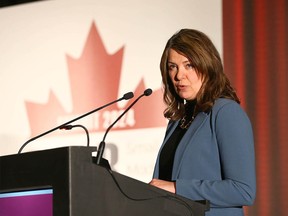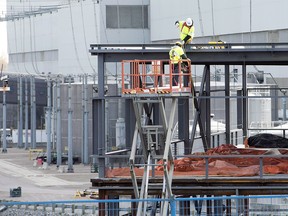‘We’re probably in the first or second inning,’ Alberta’s utilities minister said of SMR development in the province

Article content
Alberta is hoping fellow provinces can help expedite the arrival of nuclear power to the province — though that target is likely about a decade away, Premier Danielle Smith said Tuesday.
The province remains a distance away from deploying its first small modular reactor (SMR) as Alberta continues to develop its framework for the private sector and watches Ontario bring its first reactor to market later this decade, Smith said.
Advertisement 2
Article content
Article content
“Our industry is anticipating it will take until 2035 to be able to get the first nuclear rolled out in our province. I hope that we can do it a lot faster than that,” Smith said Tuesday at the SMR Canada Summit in Calgary.
The province announced on Tuesday $600,000 in funding is being allocated to SMR developer X-Energy Reactor Company LLC, in partnership with TransAlta Corporation, to study the feasibility of repurposing a fossil fuel electricity generation site for a nuclear reaction. The funding will come from the Crown-owned Emissions Reduction Alberta, which is funded through revenues from Alberta’s industrial carbon pricing system known as the Technology Innovation and Emissions Reduction (TIER) regulation.
It comes on the heels of Edmonton-based Capital Power and Ontario Power Generation’s agreement announced in January to assess the feasibility of developing SMRs in Alberta.
Smith said she’s looking to Ontario, which is currently building Canada’s first SMR in Darlington and is expected to go online in 2028. That project was announced in 2022 after the Canada Infrastructure Bank loaned $970 million to Ontario Power Generation to develop the reactor.
Article content
Advertisement 3
Article content
“We’re hoping the federal government will work with us to be able to streamline the approval processes once that’s proven technology … if we can roll it out faster, I think that there are a number of municipalities that would be interested in trying it,” Smith said.

Smith also mentioned working with Saskatchewan to develop its regulatory framework. Saskatchewan has targeted 2034 as its date for completing its first SMR.
Developing that regulation in the coming years will be key to the industry which still remains in its infancy in Alberta, said Nathan Neudorf, the province’s minister of affordability and utilities.
“We’re probably in the first or second inning,” Neudorf said of SMR development in the province.
While Alberta is currently undergoing a review of its electricity grid, the province also needs to consider nuclear’s industrial applications for sectors like oil and gas, which uses significant amounts of natural gas to power its operations, Neudorf said.
“It’s kind of a different conversation (than electricity) but it’s something that we’re well aware of because of its applications beyond electricity,” Neudorf said. “We are trying to grapple with those conversations right now.”
Advertisement 4
Article content
Region north of Grande Prairie exploring nuclear feasibility
Meanwhile, one of the biggest challenges standing in the way of mass uptake of nuclear development in Canada is finding the skilled trades workers needed to build reactors, Chris Deschenes, director of SMR business development at Ontario Power Generation, told Tuesday’s audience.
“Human Resources is likely the biggest risk to Canada realizing all of its nuclear ambitions,” Deschenes said.
The nuclear energy industry also has its work cut out to sell its technology to the public, Smith told the audience, calling the current moment a “second chance to make a first impression.”
“I would just urge you and plead with you — don’t let yourselves be depicted in the way you have,” Smith said.
Recommended from Editorial
One local government that’s trying to sell its residents on SMRs is Birch Hills County, a region north of Grande Prairie that’s home to about 1,600 people.
Advertisement 5
Article content
The region’s oil and gas sector has been in decline for several years, having long been the county’s primary source of employment, said Larry Davidson, chief administration officer for Birch Hills County. The county government has recently been seeking partnerships in the private sector to explore whether nuclear would be a feasible energy source for their region.
Most recently the county hired a consultant to help explain how nuclear would impact the region, Davidson said.
“We are trying to put the cart before the horse because so often people’s backs are up and you can give all the information you want … you won’t change their mind,” said Albert Poetker, reeve of Birch Hills County.
Article content





